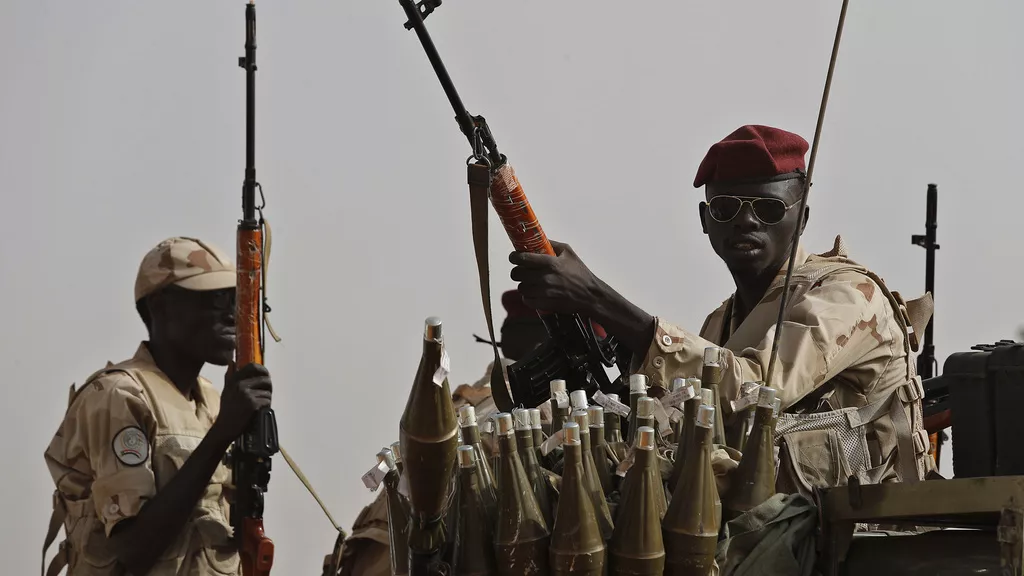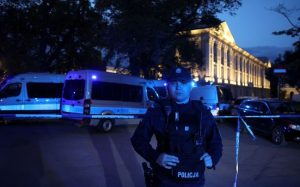French weapons system found in Sudan is likely violation of U.N. arms embargo, says Amnesty
3 min read
Amnesty International has revealed that armored vehicles manufactured by the United Arab Emirates (UAE) and equipped with French defense systems have been captured by the Sudanese army during the ongoing civil war in Sudan. The rights group’s findings, released on Thursday, underscore the involvement of foreign-made military equipment in the conflict, which has already led to widespread violence and displacement.
According to Amnesty’s report, the UAE-made armored personnel carriers (APCs), which were used by the paramilitary group Rapid Support Forces (RSF), have been spotted in various parts of Sudan, including the conflict-ridden Darfur region. These vehicles were reportedly seized by the Sudanese Armed Forces (SAF) amid their battle with the RSF. Amnesty contends that the presence of these armored vehicles, in use by one of the warring factions, is likely a violation of the United Nations arms embargo that prohibits the transfer of weapons to Sudan.
The war in Sudan erupted in April 2023 after escalating tensions between the RSF and the Sudanese military. Since then, the conflict has wreaked havoc across the country, with extensive human rights violations reported. The UN estimates that over 20,000 people have been killed, and more than 11 million people have been displaced, including 3.1 million refugees fleeing to neighboring countries. Despite Sudan’s accusations that the UAE has been supplying weapons to the RSF, the UAE government has denied these claims.
Amnesty’s report identifies the Nimr Ajban APCs, manufactured in the UAE by the Edge Group, which were captured or destroyed on the battlefield. Photos of these vehicles circulating on social media platforms were verified by Amnesty’s investigators, confirming the presence of these UAE-made vehicles in Sudan. Additionally, these APCs are equipped with the Galix reactive defense system, which is produced by French companies Lacroix Defense and KNDS France.
The Galix system is designed to protect military vehicles from potential threats, using countermeasures such as smoke, projectiles, and decoys. Amnesty’s Secretary-General, Agnès Callamard, stated that the use of French-made weaponry in Sudan is of great concern. “Our research shows that weaponry designed and manufactured in France is in active use on the battlefield in Sudan,” Callamard said. She further emphasized that the deployment of the Galix system by the RSF in Darfur would constitute a clear violation of the UN arms embargo.
In response to Amnesty’s findings, Lacroix Defense confirmed that it had supplied the Galix systems to the UAE Armed Forces for use in smoke-screening countermeasures. The company maintained that these deliveries were made in strict compliance with export licenses granted to them and the associated end-user certificates.
The Emirati government, on the other hand, dismissed the allegations, claiming that the UAE is being targeted by a “coordinated disinformation campaign” aimed at undermining its foreign policy and humanitarian efforts in the region. A spokesperson for the UAE government reiterated that the country has not supplied weapons or military support to the RSF or any other warring party in Sudan. The UAE also emphasized its involvement in humanitarian initiatives aimed at assisting the Sudanese people affected by the conflict.
The UAE’s denial comes despite ongoing international scrutiny. Last month, the United States sanctioned Algoney Hamdan Daglo Musa, a senior RSF leader, for his role in facilitating the supply of weapons to the RSF. Algoney, who is the brother of RSF commander Mohamed Hamdan Daglo, controls Tradive General Trading LLC, a UAE-based company that allegedly imported vehicles to Sudan on behalf of the RSF and retrofitted them with heavy weaponry.
The conflict in Sudan continues to raise alarms about the role of external actors and the flow of arms into the country. The presence of foreign-made military vehicles, including those from the UAE and France, further complicates efforts to end the war and stabilize the region. As Sudanese civilians suffer the consequences of the ongoing conflict, the international community is under increasing pressure to hold all parties accountable for violations of arms embargoes and human rights abuses.
In the meantime, the humanitarian crisis in Sudan deepens, with millions displaced, thousands killed, and no end to the violence in sight. The international community, including the UN and regional actors, continues to call for an end to the fighting and a renewed focus on humanitarian aid and peace-building efforts.






